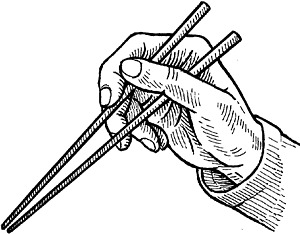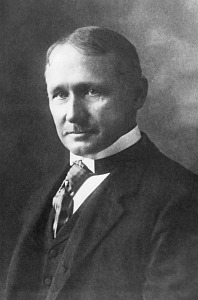Related Topics
Thinking About Thought
There's a yawning gap between concepts of the mind, and concepts of brain function.
Many Mickles in One Muckle

|
| Chopsticks |
As soon as computer processing was concentrated into one processor chip, it was apparent that faster chips were hotter than slow ones. Processor chips were therefore cooled with fans, even placed in refrigerated jackets. Eventually, final limits were reached, and one-chip processing could go no faster. Solution: add more processing chips.
The human equivalent is called specialization. So far as we presently know, the processing power of the human brain is not limited by heat generation, but it does seem limited by something. Consequently, communal projects developed the pattern of isolating single functions assigned to specialists, then reconstructing the products of specialists into a completed pattern. A Philadelphia Quaker named Frederick Winslow Taylor developed this process to a high art. John D. Rockefeller then reduced it to an epigram: "Good leadership consists of showing ordinary people how to accomplish the work of superior people."

|
| Frederick Winslow Taylor |
As long as human brain architecture remains a rough guide to computer architecture, the deconstruction-reconstruction process retains the feature of enabling machines to take up where human guidance reaches its limit. Machine-organized thought will probably leap ahead whole orders of magnitude without human guidance, but until then the fortuitous limit of what one processor can do roughly matches the capacity limit of its human operator. That is, we are forced by other circumstances to organize computer programming on the assumption that most tasks could exceed the capacity of a single processor, so a supplementary hand-off must be provided for in every instruction set.
We have now reached the point where an inexpensive pocket computer can affordably contain much more memory capacity than the human brain. It is common to see office computers with two or four processor chips. It will not be long before computer engineers will provide us with both memory and processing power a thousand times greater than the human brain, And for a while, we will not know what to do with it.
But then we enter the really modern age. The time when computer design can no longer depend on the fortuitous processes of the human mind, for a useful pattern to follow.
Originally published: Thursday, July 14, 2011; most-recently modified: Thursday, May 23, 2019